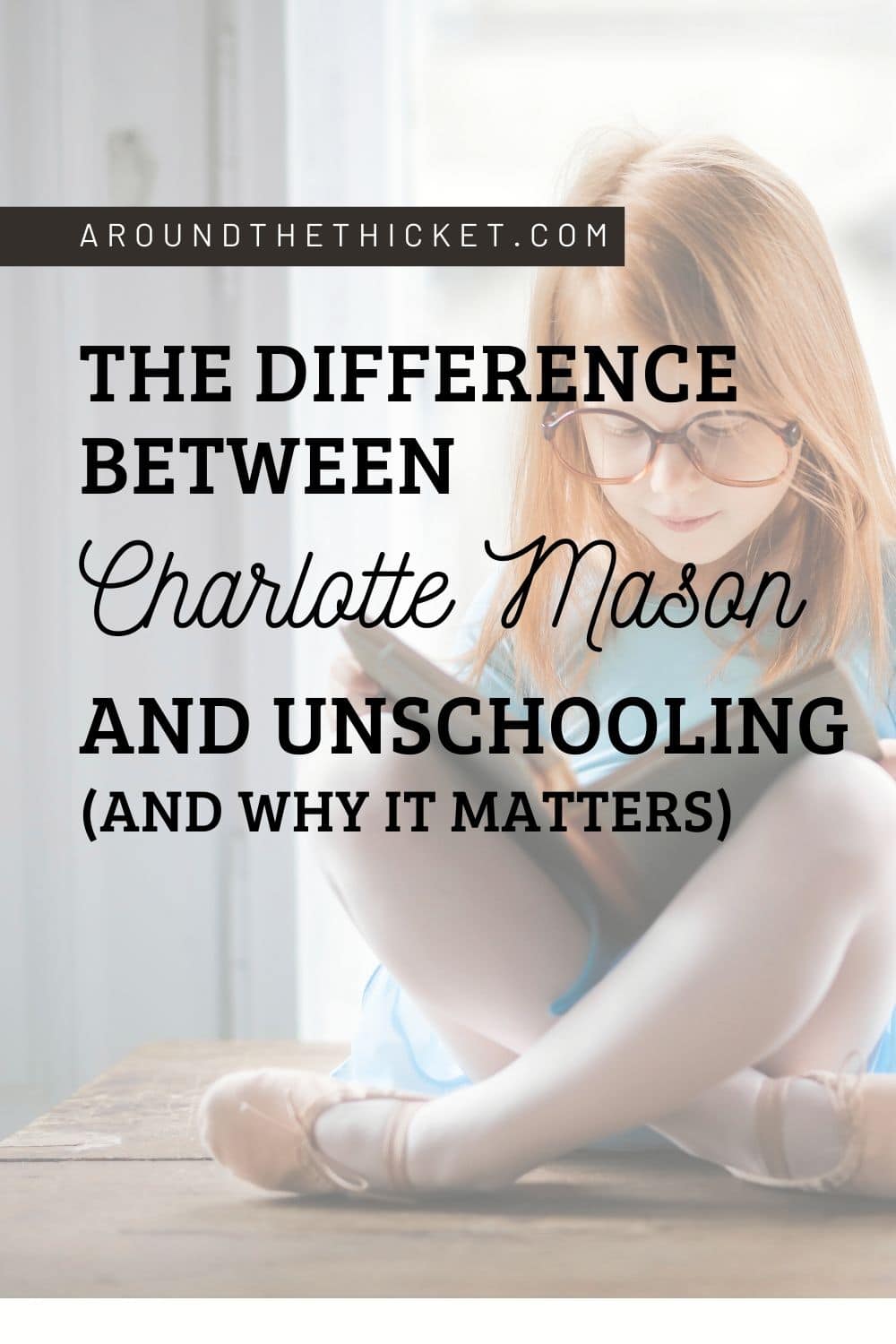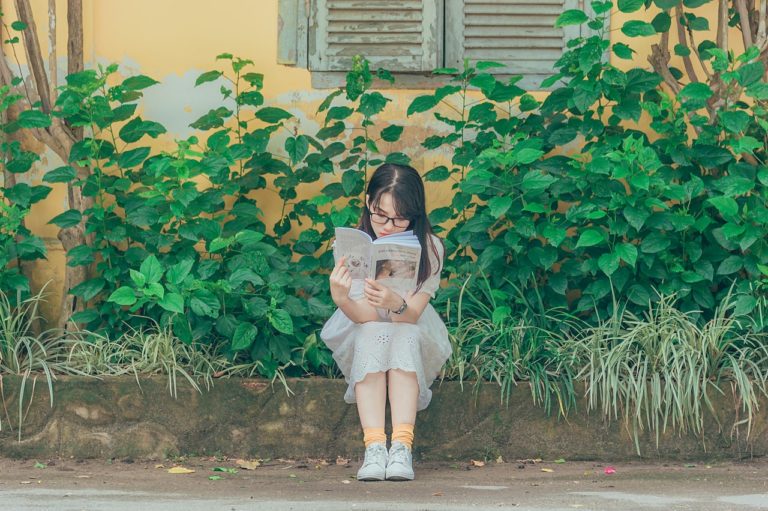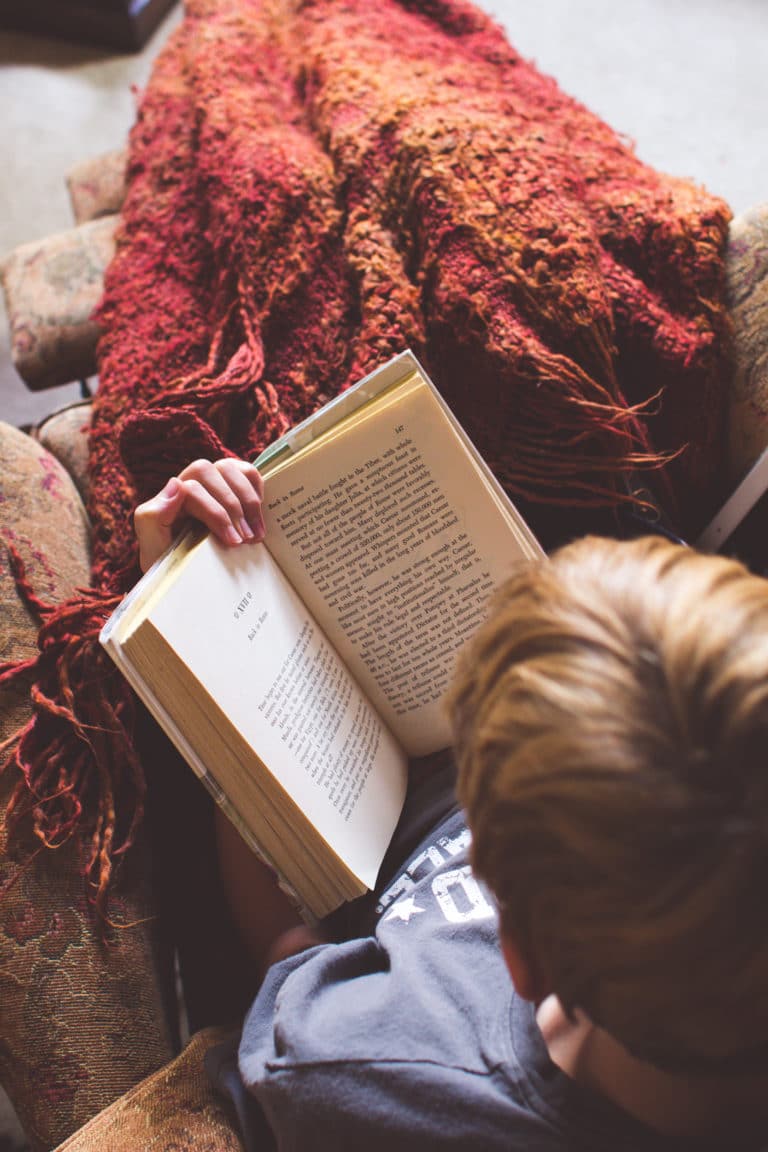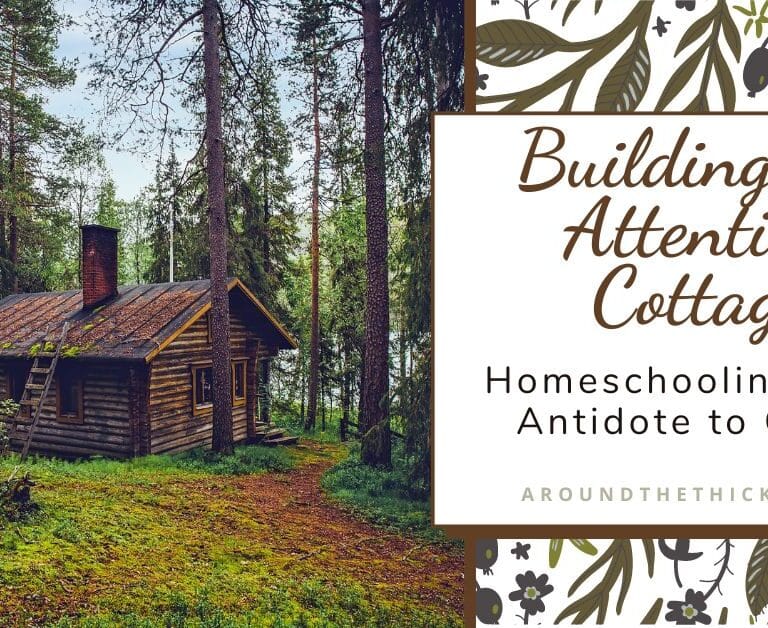Charlotte Mason and Unschooling: Comparing Two Philosophies of Education
I recently had the chance to speak at the online Learn Free conference about one of my favorite topics: Charlotte Mason for the Early Years. I focused my talk on three questions that Charlotte Mason believed would help parents direct their child’s education: why must children learn at all? What should children learn? How should they learn it? In my talk, I answered each question with one of Charlotte Mason’s principles of education, and then discussed how that principle is best applied to the early years.
Charlotte Mason clearly stated her opinion on how a child should best spend his earliest years of life. It was a joy to share her insights and take questions. We discussed delaying formal lessons, nature knowledge, and allowing a child to order his own education for the first several years of life.
One question that arose after my talk was, ‘How is Charlotte Mason different from unschooling?’. The answer to this question deserves more time than I had in a live Q&A as well as a more articulate answer, hence this post. One caveat: I do not have experise in unschooling, so please let me know if I misrepresent this approach to education so that I can revise this post. Also, I’m going to avoid questions of merit – that is for you to determine.
The Nature of the Philosophies
As I researched for this post, I found one pretty clear difference between the Charlotte Mason philosophy and unschooling. The Charlotte Mason philosophy has a single, authoritative source, while the unschooling approach is less clear cut. If you have an interest in the Charlotte Mason philosophy and what it stands for, you can read her twenty principles of education and her six volumes. She clearly explained her ideas on education, and we can still read and learn from them.
I find that there is much diversity in the unschooling movement. I don’t think that there is a consistent, agreed-upon set of principles. It is much looser. That makes comparing the two approaches to education challenging. Inevitably, some of what I write here will not fully encompass the nuances present in the unschooling approach to education.

The Purpose of Education
Why must children learn at all? This is a question Charlotte Mason poses in her first volume Home Education. Her simple answer is that children learn in order to grow. They are born with a natural appetite for knowledge, and an ability to learn.
So far, this is very similar to unschooling. But what is the trajectory of education? Our children grow off knowledge from the moment of birth, but what direction do they grow in?
From an unschooling perspective, the goal seems to be to help children meet their personal goals. They will have an interest or a curiosity about some topic, and the role of an educator is to help them pursue that interest, and learn all they desire on that topic. The role of education is not to teach a child a specific body of knowledge. Instead, educators trust children will grow up capable of teaching themselves anything they desire to learn.
From Charlotte Mason’s point of view, the purpose of education is to raise children up into maturity. Allowing and encouraging our children to pursue their own interests is a part of education. However, an educator must do more. She writes:
The object of education is to put a child in living touch with as much as may be of the life of Nature and of thought. Add to this one or two keys to self-knowledge, and the educated youth goes forth with some idea of self-management, with some pursuits and many vital interests.
Charlotte Mason, Home Education
The Nature of the Child
I think the nature of the child presents one of the key differences between unschooling and the Charlotte Mason philosophy. The Charlotte Mason philosophy does not accept that a child will, on his own, come in touch with enough variety of living ideas to become a fully mature person.
One phrase I hear quite a bit in classical and Charlotte Mason circles reflects this idea: Exposure breeds interest. Charlotte Mason believed deeply that the ultimate measure of an education is how much a child cares about the world around him or her, and how many things he or she cares about. And for a child to care about many things, they must be introduced to many things, many times over.
From a strict unschooling point of view, a child’s interests, however they come to have them, are sufficient and inherently good. A child’s laser focus on one subject area (math, Victorian England, snails, etc.) would be celebrated and encouraged. From a Charlotte Mason point of view, this would be seen as a force that needs balance. The educator helps the child to develop even more interests in other disciplines. (Brandy Vencel writes about how this played out in her homeschool.)
Furthermore, Charlotte Mason would not agree that all of a child’s interests or tendencies are inherently good. She certainly believed that every child has potential for good. Many people in her day touted the belief that a child’s genes determined his or her character. Still, Charlotte Mason also thought every child will have some tendencies towards vice. Part of education is encouraging the good to develop and limiting the growth of the bad.

The Role of the Educator
Charlotte Mason likened education as laying a table for a feast, and inviting our children to partake. The educator must set the menu, cook the food, and ensure that the child comes to the table. This means that the teacher or parent chooses a wide variety of living books across many subject areas. He or she prepares to read from them in a graduated and orderly way, and takes time to read to their child (or have them read) and asks them to narrate. Charlotte Mason believed that this was an appropriate use of a parent or educator’s authority.
Within the unschooling approach, a teacher (or parent) is an enabler of a child’s goals and learning. Their role is to provide books, materials, access to information, rather than to set the course. I will draw a parallel to the metaphor above. Instead of laying the table with the feast, the role of the educator in unschooling is to keep plenty of ingredients in the cupboards so that their child can cook what they would like to eat. (Or even pop out to the shop to get more!)
Charlotte Mason also believed that children should have plenty of time to pursue their own interests. She insisted on short lessons, especially for younger children, and no lessons for children under six. But I think she would ultimately say that a child needs a well-balanced (intellectual) diet, and that requires input and direction from the parent.
The Means of Education
How does a child become educated? I believe both Charlotte Mason and unschooling begin in a similar place. Life is constantly educational, always bringing new, fresh ideas to our children. Life naturally brings circumstances that challenge our children and help them grow. But then the philosophies diverge.
From an unschooling point of view, as our children develop interest in an area, they are enabled to pursue their curiosity. Educators provide them with resources, including books, visits to museums and libraries, talking with experts. The educator helps the child access these resources. In general, there is a focus on experiential, ‘hands-on’ learning.
I don’t believe that Charlotte Mason would discourage or disallow any of these things. Especially in a homeschool, parents naturally help their children pursue their interests and continue their learning. But rather than hands-on learning, at the heart of her philosophy we find living books and narration.
Living books are beautifully written books, either fiction or non-fiction, that communicate powerful ideas that encourage our children to think and that take hold in our children’s minds and hearts. Charlotte Mason believed that books are the best way to deliver life-giving knowledge to children. Because they are written by experts who have thought carefully about how to best present their material, rather than through a lecture or a non-expert teaching a subject.
In narration, children simply tell back, or write down, what they have read. This process helps a child to process what they’ve learned and helps them remember it later. Charlotte Mason believed that narrating living books from a wide range of subjects is how a parent can best introduce a child to many areas of life-giving knowledge.
I am sure that unschoolers make use of many beautiful living books, and that they regularly talk about them with their children. I think the difference between the philosophies is the necessity and primacy of living books and narration in the Charlotte Mason philosophy, and that the educator is to choose them rather than the child (at least the ones used during lessons).
A Note on the Early Years
Many of the differences between the Charlotte Mason philosophy and unschooling are most apparent during the years where Charlotte Mason would recommend formal school lessons. In the Charlotte Mason philosophy, this is from the age of six until the child leaves school. Before this time, as I mentioned in the introduction, it can be hard to distinguish between the two philosophies. Both allow a child to order their own education. They generally encourage children to go outside as much as possible taking in new knowledge through experience, and ‘teaches by the way’.
I think that there are differences under the surface that connect to the basic principles I’ve mentioned above. The best, most nourishing mental ‘food’ for young children is that ‘which they get through their five senses’, from Charlotte Mason’s standpoint. So extended time outdoors is essential because that is where they will find appropriate ideas to grow upon. Again, if exposure breeds interest, then time in nature is the best way to encourage a child’s interest in what is healthy and wholesome for them.
But from Charlotte Mason’s perspective, our children will reach a point when we want to gently widen their knowledge and their areas of interest. So, around the age of six, we begin to intentionally present our children with these curated living books. We begin to use narration as a tool to help them take in living ideas. This starts as a very small proportion of their time. Even with lessons, we allow them ample opportunity to pursue their own ideas and interests.
The difference in the early years, in my opinion, is trajectory. The Charlotte Mason philosophy is about a child growing up to have ‘many vital interests’. A ‘quiet growing time’ is the very best foundation for that. From an unschooling perspective, parent-imposed lessons would stifle the child’s intrinsic interests. The application of the two philosophies therefore looks similar on the surface.
Why does understanding the difference between these two philosophies even matter? To some people it might not matter at all. But time and again, I read Charlotte Mason’s words, imploring parents to ‘know what they are about’. She wanted parents to have ‘some definite views on education’. I think it behooves us all to step back for a few moments and consider what the purpose of education really is, and how that is best accomplished. Whatever that long-term goal is, it will make our immediate choices much clearer.
Want to find your feet with the Charlotte Mason Way?

Grab my eight day mini course on the Charlotte Mason Essentials when you subscribe to my newsletter. You’ll get daily emails, a mini podcast series, and a printable workbook with reading assignments and action steps. You’ll be on your Charlotte Mason journey in no time!









Thankyou – as a former unschooling parent with two young children, in this post you have hit on the nub of it for me. I’m transitioning to a Charlotte Mason approach and it’s the underlying trajectory issue that has had me mulling and chewing for the last few years. I really appreciate your succinct and insightful post. I’ve just stumbled over your site and have already gained much nourishment. Wonderful reading!
Tessa, I’m so glad you have enjoyed this post and other parts of the website!
I think the diversity of unschoolers you noted makes a significant practical difference here. We’re unschoolers. We also, as Christians, believe we’re called to disciple our children, and that involves more direction and “shaping” than some more radical unschoolers might embrace. We believe we shape the child’s environment (which can be very much like “laying a feast”) and train their values so that they’ll recognize the need for some balance in areas they might not otherwise enjoy. (Unschoolers don’t believe kids should only do what they feel like; but also what they’ve figured out they NEED.)
I read a quote shortly before coming across this post that, IMO, sums it up well: “unschooling does not mean a life without limits; it means a life without arbitrary limits.” (Jennifer McGrail)
We love good literature, and we certainly believe in being exposed to a variety of ideas. But why should every child in every home be forced to read exactly the same selection of books? They aren’t all the same. Charlotte Mason’s principles are excellent, but the nature of the approach is such that it results in a one-size-fits-all approach to education. THAT is the major difference between the two philosophies: unschooling is predicated on the assumption that every individual has unique gifts, strengths, needs, passions, and purposes, and their education should prepare them to live their *own* lives, not the same life as everyone else.
Thank you for your thoughtful comments, Rachel! I think Charlotte Mason would agree that children have needs which must be met, even if they don’t feel like it all the time – specifically, that they have an intellectual hunger which needs to be regularly fed with living ideas.
Interestingly, your points about where Charlotte Mason and unschooling diverge are actually places of agreement.
Starting with the quote, Charlotte Mason wrote adamantly against arbitrary authority (she mentions this in the first few chapters of her third volume). “The person under authority holds and fulfils a trust; in so far as he asserts himself; governs upon the impulse of his own will, he ceases to be authoritative and authorised, and becomes arbitrary and autocratic.” In other words, parents have no right to use their authority to assert their own arbitrary rules and limits in whatever way they deem fit. Instead, authority comes from God, to fulfill His purposes in the way He sees fit.
A Charlotte Mason education does not force children to read certain books. Charlotte Mason was adamant that we give our children the absolute best books. These books should be a delight to read, brimming with living ideas and beautiful language. In other words, while the educator has done the work to find these books, they are attractive in themselves to the children. They are enjoyable. And they meet the fundamental need of children for the ‘mental nutrition’ of living ideas that I mentioned above.
Does every book hit that note with every child? Of course not. I work hard to cook tasty, healthy meals for my children, and plenty of them fall flat, too. And for that reason the educator might choose to flex their plans in response to that child – either dropping a book, waiting a while and trying again, or some other approach. Again, CM education is not prescriptive. There is no forcing. I can’t force my child to read and learn any more than I can force him to chew and digest his food.
Charlotte Mason’s principles do not lead to a one-size-fits-all education. Principles of good nutrition result in an infinite variety of wholesome meals and principles of good education result in an infinite variety of books, lessons, and ideas. Frankly, an educator who believes that working through a specific and predetermined set of books qualifies as a CM education (without any thought to the children, their personalities, and the context of that family) has misunderstood and misapplied the principles.
This is not a tick-box “system” of education with predictable, guaranteed results. Instead, it is understood that every child will take from their school books the ideas appropriate and nutritious for himself, that each child will make their own connections between what they read and what they already know, that every child will develop their own principles and form their own opinions.
Finally, Charlotte Mason’s philosophy says that children are individuals, and that the function of education is to prepare to live their own lives by giving them an abundant feast of ideas from which they can begin to form their principles. This is why children are never, ever taught what to think or what their opinions ought to be. To Charlotte Mason, that is an abuse of authority.
Charlotte Mason is obviously not unschooling, but I don’t think we disagree on the points you brought up. In fact, you seem to be relatively in line with Charlotte Mason’s principles, and I suspect where we differ are some of the finer pedagogical points (whether a child should narrate, or history studied chronologically, for example).
I just found this post and am so glad I did! We’ve dabbled in a variety of homeschool methods over the years, until finally finding CM a few years back. We absolutely loved all its philosophies, but about a year ago we set out to travel full time (internationally), so we didn’t see how we could continue a CM approach (especially with the lack of books we’d have). So we’ve been trying worldschooling and a bit of unschooling for a while, but always feeling like it just wasn’t enough. I love the freedom and choice of unschooling, but it does seem that not having that “feast” has caused my kids to be less interested in pursuing much of anything. The quote, “exposure breeds interest” couldn’t be more true! We will be heading back to the U.S. soon and setting up a home base, so I was feeling stuck with what to do then with our homeschool approach. This article is exactly what I needed to read, to reassure me that while there are many ideas we love about unschooling (a lot of which can still be done i.e. pursuing ones interests), the Charlotte Mason method is ultimately what will be best for our family in the near future. Thanks again! I look forward to reading more of your blog as we set out (again) on this learning adventure!
Heather, I’m so glad the article was helpful! How exciting to have had time to travel overseas – I’m sure your kids will draw from that experience through their whole lives!